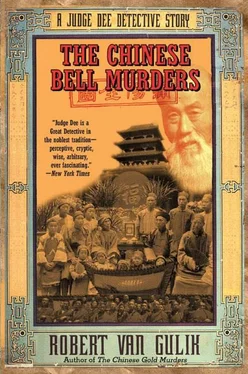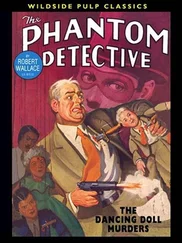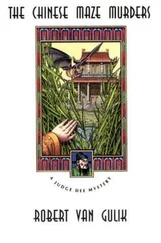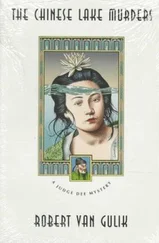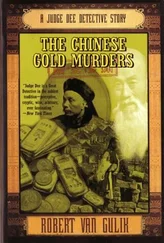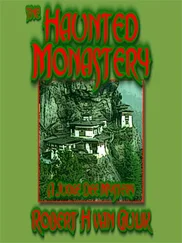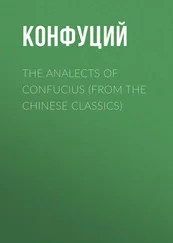Van Gulik's fascination with Judge Dee, an exemplar of the imperial magistrate and of the Confucian scholar, led him to further investigations of Chinese jurisprudence and detection. In 1956 he published his English translation of a thirteenth-century case manual called T'ang-yin pi-shih.
Van Gulik's engrossment with detective literature was soon paralleled by an interest in Chinese erotic literature and art, especially in that of the Ming dynasty (1368-1644). Dalliances with courtesans and concubines were often as much a part of the Chinese gentleman's life as the collecting of ink stones or the playing of the ch'in. To demonstrate this point, Van Gulik, always a connoisseur of Chinese pictorial art, published at Tokyo in 1951 a private edition in fifty copies of erotic color prints of the Ming era along with a handwritten essay on the history of Chinese sex life from 206 B.C. to a.d. 1644. While extramarital sex and the popular novel were generally considered off-limits for the Confucian scholar-gentleman, it is clear that many such men relished illicit sex and enjoyed and wrote novels surreptitiously. Through a number of works Van Gulik showed that although the gentlemen of traditional China often gave lip-service to high moral standards, they displayed in their personal lives the moral weakness of people everywhere,
While the erotica published by Van Gulik circulated only to a select audience, his numerous translations and adaptations of Chinese detective stories made Judge Dee famous in the West, especially during the 1950s. Whether posted in New Delhi, The Hague, or Kuala Lumpur, Van Gulik continued to turn out the Judge Dee stories, to a total of at least seventeen. His final diplomatic appointment brought him back to Tokyo in 1965 as the ambassador of the Netherlands to Japan, a post that he had long coveted. Two years later, while on home leave ,Van Gulik put down his writing-brush for the last time.
Throughout his relatively short life, Van Gulik found time in the midst of his busy diplomatic career to inquire into an amazing variety of esoteric subjects and to publish his findings. He did not focus upon the great political, social, or economic problems of China, though he was certainly aware of their significance, in touch with the latest scholarly debates, and cognizant of contemporary political events. He did not specialize in a particular period, or even in literature alone, but ranged in his quests from Chinese classical antiquity (ca. 1200 b.C.-a.d. 200) to the end of the Ch'ing dynasty (a.d. 1644-1911). His interest was limited to traditional China rather than to the twentieth-century country with its postimperial and revolutionary struggles. He sought out the "little topics" usually favored by dilettantes and amateurs of arts and letters. To the investigation of these previously unstudied byways he brought his considerable talents as linguist, historian, and connoisseur. While many of his scholarly works appealed to a limited public, his researches into the novel, jurisprudence and crime detection, and erotica were brought to Western popular audiences through his stories about the exploits of Judge Dee, the Sherlock Holmes of China.
Until the present century, the popular Chinese novel was not studied seriously by scholars either in China or in the West. It was in the era between the two world wars that intensive study of Chinese popular literature began. In the aftermath of the Chinese revolution of 1911-12 and of the disruptions brought on by the First World War, the new literati of Republican China sought to establish the spoken language (pai-hua) as the general language in order to help modernize the country. The leaders of this radical literary renaissance-Hu Shih, Lu Hsun, and Ts'ai Yiian-p'ei-began to revive the popular literature of the past in the hope of showing that the spoken language had been, and so might be to a greater extent in the future, a sturdy vehicle of literary expression. Because they were also eager to provide new reading matter for the masses, they looked to the past for appealing tales, intricate plots, and moral examples which could be reissued or refurbished for the public. As recently as 1975, Chinese archeologists uncovered in Hupeh Province a cache of bamboo books from the Ch'in dynasty (221-207 B.C.) which reportedly include materials on crime and detection as well as popular accounts of the magistrate as detective. Thus the search for the origins of the crime novel is being continued.
The Japanese literati, who were not as prejudiced against popular literature as their Chinese contemporaries, had long collected Chinese popular dramas and stories and had sometimes adapted them to Japanese tastes before publishing new editions. Western scholars, especially the French school of sinologues exemplified in our century by Paul Pelliot, had studied Chinese legend and story before the reforming scholars of the Chinese Republic became alert to their importance as mediums of political instruction and propaganda. In the 1930's the Chinese Communists likewise became aware of the significance of popular drama for propaganda; nor have they lost that awareness since taking over the government in 1949.
Van Gulik, a product of the European sinological school dominated by Pelliot, shared that school's enthusiasm for comparative studies and exotic subjects. For this breed of scholars, the smallest and most esoteric topics became broadly meaningful through the extraordinary linguistic, literary, and artistic analyses and perceptions of the investigator. In short, the subject was given importance, substance, and relevance by the imaginative powers and talents of the researcher. When Van Gulik first arrived in Japan in 1935, he was quick to see that its artistic collections and libraries were rich in the materials of Chinese popular culture. As an imaginative scholar with limited time at his disposal, Van Gulik immediately realized that he could produce fascinating studies of the culture of the Chinese gentry through intensive study of the objects which those privileged people collected and the customs they observed.
The Chinese crime or courtroom novel was a later form of one of the main genres of the colloquial narrative tradition- the detective story. From the time of the Sung dynasty (a.d. 960-1279), and probably much earlier, the common people delighted in listening to the tales of the storytellers who performed in the bazaars or on the streets of cities and towns. One of the popular detective heroes of the storytellers was Judge Dee (Ti Jen-chieh), a historical personage and statesman of the T'ang court who lived from a.d. 630 to 700. He and other magistrates, especially Pao Cheng (a.d. 999-1062), were celebrated by storytellers, dramatists, and novelists. In the process the historical deeds of the judge became the basis for legendary accomplishments in detection, unswervingly right conduct, and superhuman insight. The judge-detective became the central figure of a stereotype that permeated all forms of popular literature.
The hero of the traditional Chinese detective novel is normally a local magistrate. The story is usually told in colloquial language from the point of view of the working magistrate, who acts as detective, inquisitor, judge, and public avenger. It ordinarily involves a number of crimes, for the magistrate rarely had the leisure or opportunity to deal with one crime at a time. The crimes normally occur early in the story and are often interrelated. Usually the plays or stories are not didactic, and involve crimes against the person rather than misdeeds against society. The crime is always a specific infraction of statute law, ordinarily murder or rape or both. The judge acts as the instrument of the state or the emperor in establishing the facts of the case, capturing the criminal, and meting out the punishments prescribed by law. There is almost no place in the traditional stories for the judge personally to exercise discretion, extend mercy, or play favorites. The judge exemplifies courage, sagacity, honesty, impartiality, and severity; he possesses a flair for detection which is sometimes aided by superhuman insights or by knowledge conveyed to him by ghosts directly from the netherworld. Humor and lightness are rarely associated with the judge, though his subordinates sometimes become involved in clownish escapades.
Читать дальше
